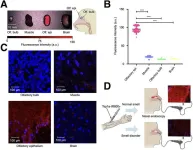(Press-News.org) Twenty minutes of mindful breathing, which focuses a person’s attention on their breath, can rapidly reduce the intensity and unpleasantness of cancer pain and relieve the associated anxiety, suggest the findings of a small comparative study, published online in the journal BMJ Supportive & Palliative Care.
Mindful breathing complements traditional pain relief and broadens the repertoire of options available for cancer patients, say the researchers.
Moderate to severe pain affects an estimated 30-40% of patients with cancer worldwide, as a result of the tumour compressing or invading surrounding tissues, neuropathic mechanisms, and the side effects of treatment, say the researchers.
Despite advances in pain management, and an evolving range of drugs and nerve blocks, inadequate pain control remains a substantial challenge for clinicians, they add.
Among the array of complementary treatments, such as cognitive behavioural therapy, massage, acupuncture, and exercise, the value of mindfulness based interventions is increasingly being recognised, say the researchers.
But the research to date on the effectiveness of mindfulness for pain relief has primarily focused on programmes lasting several weeks or just 5-10 minutes, or on people who don’t have cancer.
In light of previously published research indicating that periods longer than 10 minutes might effectively relieve pain, the researchers wanted to find out if a single session of mindfulness breathing lasting 20 minutes might do the same for patients with cancer.
To find out, they randomly assigned 40 inpatients (out of 259 approached) with different types of cancer, and a pain score of 4 or more out of 10, indicating moderate to severe pain, to one of two groups.
One group (21 people) did a mindful breathing session, guided by a doctor who had been trained in mindfulness techniques. The session involved a brief explanation of mindfulness concepts and practices, followed by 20 minutes of mindful breathing.
The session consisted of 4 steps, each lasting 5 minutes: identifying the in-breath and out-breath; following the entire length of the breath; bringing the mind back to the body; and relaxing the body, starting with the head all the way down to the feet.
The other group (19 people) received a 20-minute supportive listening session led by a doctor, during which they were asked about their experiences of illness using semi-structured questions.
Before and after each intervention, the intensity and unpleasantness of every patient’s pain was measured using the validated Numeric Rating Scale (0-10), while the Hospital Anxiety and Depression Scale (HADS), consisting of 14 items rated on a 4-point scale, was used to assess their mood.
Background information and pertinent clinical data, such as cancer types and stages, and use of pain relief, including morphine, were retrieved from the hospital’s medical records.
The patients’ average age was 63, and although various cancer types were represented among them, 1 in 3 had bowel cancer. Twenty nine had stage III or IV disease. Nearly two-thirds (65%) were using opioids to control their pain.
The results showed that the mindful breathing group experienced a much greater (and significant) reduction in pain intensity and pain unpleasantness than the comparison group. They also experienced a much greater reduction in HADS score.
The researchers acknowledge the relatively small size of the study, and the fact that it was carried out at one medical centre only. The nature of pain intensity/unpleasantness and psychological outcomes were also subjectively assessed.
But patients with cancer often face practical constraints, so brief mindfulness interventions that can quickly reduce pain and complement traditional pharmacological approaches are worth exploring, they suggest.
“Additionally, the 100% response rate and the absence of adverse events underscore the feasibility and safety of the 20-minute mindful breathing intervention. The intervention can be quickly learnt and applied with beneficial effect,” they add.
“The findings suggest that this brief intervention holds promise in reducing pain intensity and unpleasantness, as well as alleviating anxiety among patients with cancer. While further research is needed to consolidate these findings, the study contributes valuable insights into a feasible and accessible non-pharmacological approach to enhance pain management in cancer care,” they conclude.
END
20 minutes of mindful breathing can rapidly reduce intensity of cancer pain
It complements traditional pain relief and broadens repertoire of options, say researchers
2024-08-21
ELSE PRESS RELEASES FROM THIS DATE:
Hospital bacteria tracked better than ever before with new technique
2024-08-21
Researchers have developed a new genomic technique that can track the spread of multiple superbugs in a hospital simultaneously, which could help prevent and manage common hospital infections quicker and more effectively than ever before.
The proof-of-concept study, from the Wellcome Sanger Institute, the University of Oslo, Fondazione IRCCS Policlinico San Matteo in Italy, and collaborators, details a new deep sequencing approach that captures all the common infectious bacteria in a hospital at once. Current methods culture and sequence all pathogens separately which takes longer and requires more work.
Published ...
Red and processed meat consumption associated with higher type 2 diabetes risk, study of two million people finds
2024-08-21
Meat consumption, particularly consumption of processed meat and unprocessed red meat, is associated with a higher type 2 diabetes risk, an analysis of data from 1.97 million participants, published today in The Lancet Diabetes and Endocrinology, has found.
Global meat production has increased rapidly in recent decades and meat consumption exceeds dietary guidelines in many countries. Earlier research indicated that higher intakes of processed meat and unprocessed red meat are associated with an elevated risk of type 2 diabetes, but the results have been variable and not conclusive.
Poultry ...
Environmental laws failing to slow deforestation
2024-08-21
Australia’s environmental laws are failing to stop high rates of tree clearing to make way for agriculture, development and mining, according to University of Queensland research.
PhD candidate Hannah Thomas from UQ’s School of the Environment led a team which used satellite mapping and land clearing data to analyse vegetation loss across northern Australia, including Queensland, the Northern Territory and Western Australia.
“We mapped clearing greater than 20 hectares and then investigated which national or state and territory laws were likely to apply,” Ms Thomas said.
“Of the 1.5 million hectares ...
Mother’s gut microbiome during pregnancy shapes baby’s brain development
2024-08-21
A study in mice has found that the bacteria Bifidobacterium breve in the mother’s gut during pregnancy supports healthy brain development in the fetus.
Researchers have compared the development of the fetal brain in mice whose mothers had no bacteria in their gut, to those whose mothers were given Bifidobacterium breve orally during pregnancy, but had no other bacteria in their gut.
Nutrient transport to the brain increased in fetuses of mothers given Bifidobacterium breve, and beneficial changes were also seen in other cell processes relating to growth.
Bifidobacterium breve is a ‘good bacteria’ that occurs naturally in our ...
Humpbacks are among animals who manufacture and wield tools
2024-08-21
In a study published today in Royal Society Open Science, researchers at the Marine Mammal Research Program (MMRP) at UH Hawaiʻi Institute of Marine Biology (HIMB) and Alaska Whale Foundation (AWF) consider a new designation of the humpback whales they study: tool wielders. Researchers have known that humpback whales create “bubble-nets” to hunt, but they have learned that the animals don’t just create the bubble-nets; they manipulate this unique tool in a variety of ways to maximize their food intake in Alaskan feeding grounds. This novel research demystifies a behavior key to the whales’ survival and offers a compelling case for including humpbacks among the rare ...
UTA federal research expenditures doubled in 2023
2024-08-20
In 2023, federally sponsored research at The University of Texas at Arlington accounted for $77 million in expenditures, with about $40.7 million spent on research-related goods and services in Texas. That more than doubles the total for 2022, when federally sponsored research at UTA contributed $38 million to the economy.
The $77 million is a portion of UTA’s $122 million in total research expenditures from all sources last year. This number includes federally sponsored research awards as well as those from local and state governments, private institutions, and other sources. Overall, UT Arlington and its 270,000 alumni contribute $29 billion ...
Researchers teaching artificial intelligence about frustration in protein folding
2024-08-20
Scientists have found a new way to predict how proteins change their shape when they function, which is important for understanding how they work in living systems. While recent artificial intelligence (AI) technology has made it possible to predict what proteins look like in their resting state, figuring out how they move is still challenging because there is not enough direct data from experiments on protein motions to train the neural networks.
In a new study published in the Proceedings of the National Academy of Sciences on Aug.20, ...
Novel molecular imaging tool objectively measures and diagnoses smell disorders
2024-08-20
Reston, VA (August 20, 2024) -- A new fluorescent imaging probe can for the first time objectively and non-invasively measure loss of smell, clinically known as anosmia. Targeting the olfactory nerve, the new tool has potential to eliminate biopsies used to diagnose certain anosmia conditions and to aid in the development of therapeutic interventions. This research was published in the August issue of The Journal of Nuclear Medicine.
Research shows that an estimated 13.3 million adults in the United States have a vast range of smell disorders and that ...
Tiny killers: How autoantibodies attack the heart in lupus patients
2024-08-20
New York, NY—August 20, 2024—Cardiovascular disease is the leading cause of death in patients suffering from lupus, an autoimmune disease in which our immune system attacks our own tissues and organs, the heart, blood, lung, joints, brain, and skin. Lupus myocarditis--inflammation of the heart muscle-- can be very serious because the inflammation alters the regularity of the rhythm and strength of the heartbeat. However, the mechanisms underlying this complex disease are poorly understood and difficult to study.
A long-standing question about lupus is why some patients develop myocarditis while others remain unaffected. And why the clinical manifestations of affected ...
Study: Temporarily removing firearms from people at risk of harm saves lives
2024-08-20
DURHAM, N.C. – An estimated one life was saved for every 17 times an extreme risk protection order removed guns from people who presented a risk of harming themselves or others, according to a Duke Health-led analysis of the laws in four states.
Extreme risk protection orders -- known as ERPOs or “red flag laws" -- are civil court orders that temporarily prevent people from accessing firearms after a judge determines that they pose an imminent risk of harming themselves or others. Twenty-one states and the District of Columbia have enacted ERPO laws, mostly in ...
LAST 30 PRESS RELEASES:
New knowledge on heritability paves the way for better treatment of people with chronic inflammatory bowel disease
Under the Lens: Microbiologists Nicola Holden and Gil Domingue weigh in on the raw milk debate
Science reveals why you can’t resist a snack – even when you’re full
Kidney cancer study finds belzutifan plus pembrolizumab post-surgery helps patients at high risk for relapse stay cancer-free longer
Alkali cation effects in electrochemical carbon dioxide reduction
Test platforms for charging wireless cars now fit on a bench
$3 million NIH grant funds national study of Medicare Advantage’s benefit expansion into social supports
Amplified Sciences achieves CAP accreditation for cutting-edge diagnostic lab
Fred Hutch announces 12 recipients of the annual Harold M. Weintraub Graduate Student Award
Native forest litter helps rebuild soil life in post-mining landscapes
Mountain soils in arid regions may emit more greenhouse gas as climate shifts, new study finds
Pairing biochar with other soil amendments could unlock stronger gains in soil health
Why do we get a skip in our step when we’re happy? Thank dopamine
UC Irvine scientists uncover cellular mechanism behind muscle repair
Platform to map living brain noninvasively takes next big step
Stress-testing the Cascadia Subduction Zone reveals variability that could impact how earthquakes spread
We may be underestimating the true carbon cost of northern wildfires
Blood test predicts which bladder cancer patients may safely skip surgery
Kennesaw State's Vijay Anand honored as National Academy of Inventors Senior Member
Recovery from whaling reveals the role of age in Humpback reproduction
Can the canny tick help prevent disease like MS and cancer?
Newcomer children show lower rates of emergency department use for non‑urgent conditions, study finds
Cognitive and neuropsychiatric function in former American football players
From trash to climate tech: rubber gloves find new life as carbon capturers materials
A step towards needed treatments for hantaviruses in new molecular map
Boys are more motivated, while girls are more compassionate?
Study identifies opposing roles for IL6 and IL6R in long-term mortality
AI accurately spots medical disorder from privacy-conscious hand images
Transient Pauli blocking for broadband ultrafast optical switching
Political polarization can spur CO2 emissions, stymie climate action
[Press-News.org] 20 minutes of mindful breathing can rapidly reduce intensity of cancer painIt complements traditional pain relief and broadens repertoire of options, say researchers






